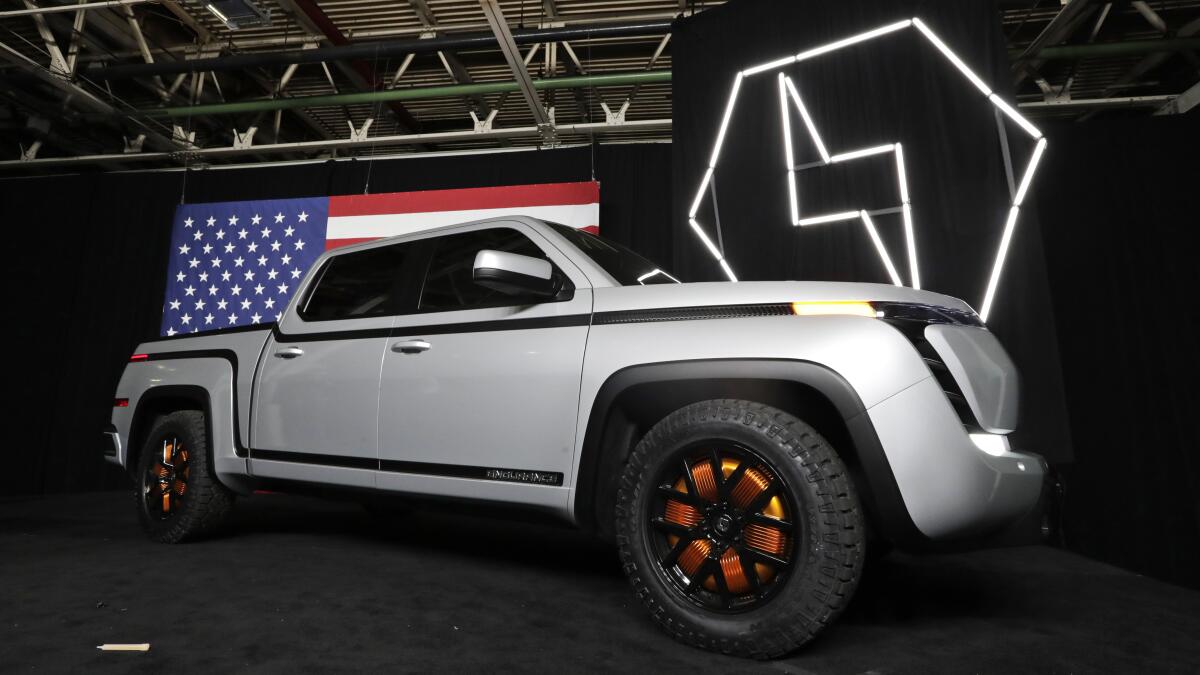Lordstown Motors’ top two execs resign after board finds evidence of inaccuracy

- Share via
Lordstown Motors Corp.’s shine dimmed further Monday as the electric truck startup’s two top executives stepped down after the company’s board found evidence of inaccurate statements. The onetime star special purpose acquisition company’s stock took its biggest one-day drop ever.
Chief Executive Steve Burns and Chief Financial Officer Julio Rodriguez have resigned from the company, effective immediately, the company said in a statement Monday. Burns declined to comment about his exit in a text message.
It was the latest setback for the company, which warned last week that it might not have enough cash to fund development of its first truck or even survive the next 12 months if it can’t raise more capital. In March, the startup disclosed a Securities and Exchange Commission investigation of its operations after a short seller said that its technology was flawed and that preorders for its truck were nonbinding.
Shares of the company sank 19% to $9.26 — the lowest in almost three weeks. The stock is down 54% this year and more than 70% below the closing high of $31.40 it reached in September.
It may come under further selling pressure from “potential stock disposals” by Burns, who is the single largest shareholder with a 26.5% stake, Adam Jonas, an analyst at Morgan Stanley who recently pulled his rating on Lordstown, wrote in a research note.
Lordstown is one of a slew of electric-vehicle startups that have gone public through mergers with SPACs, which have been controversial because they’ve made public companies out of young ventures that have little in the way of revenue or commercially viable products. Lordstown combined with DiamondPeak Holdings in an October deal that netted the electric truck company $675 million.
The company said in a separate statement that a board investigation concluded it had made misstatements about its vehicle preorders. The inquiry cited instances when the startup inaccurately claimed preorders came from commercial fleets, instead of from third-party management companies or “influencers” that didn’t plan to buy trucks directly.
It also found that some of the preorders were placed by ostensible buyers unlikely to have the resources to complete the orders or whose commitments were “too vague or infirm to be appropriately included in the total number of preorders disclosed.”
In a March report, short seller Hindenburg Research called Lordstown’s claim that it had 100,000 preorders for its truck “fictitious.”
As recently as last month, Burns told analysts on a conference call that Lordstown had halted preorders at 100,000 vehicles but had begun accepting an additional 23,000 “vehicle purchase agreements,” most of which included down payments.
Lordstown’s board concluded that other allegations made by Hindenburg in March were “false and misleading” in many aspects.
The company’s lead independent director, Angela Strand, has been named executive chairwoman, and she will oversee the company until a new CEO is identified. Becky Roof, who has previously served as an interim finance chief at other corporations, will do the same at Lordstown.
“We remain committed to delivering on our production and commercialization objectives, holding ourselves to the highest standards of operation and performance and creating value for shareholders,” Strand said in the statement.
Hindenburg alleged that Burns had been forced out of his former company, electric-van maker Workhorse Group Inc. He left that company in 2019 and founded Lordstown. Burns denied Hindenburg’s allegations.
Burns’ abrupt departure and Lordstown’s finding that it made misstatements during his tenure are eerily similar to what transpired at Nikola Corp., another electric-vehicle startup that went public via a blank-check company. Nikola’s founder and CEO also stepped down after Hindenburg targeted the company for misleading investors, something the startup later confirmed.
Lordstown drew attention to itself when it acquired a shuttered General Motors Co. factory in Youngstown, Ohio, where it plans to manufacture its own vehicles. The move was lauded by then-President Trump’s administration after he had promised to bring back work to the thousands of workers who lost jobs when the plant was closed in 2019.
The exit of Lordstown’s two top executives comes at a difficult time for the company as it attempts to transition from research and development into commercial production of its first model.
The company is trying to build a unique electric pickup — with a motor at each wheel. That makes it an engineering challenge. It is working with technology licensed from Elaphe Propulsion Technologies of Slovenia to produce the motors. Lordstown’s board rejected an allegation from Hindenburg that the technology isn’t workable in a commercial vehicle.
“While hub motors have not previously been used at scale in commercially-produced passenger vehicles, the hub motor technology licensed from Elaphe is viable,” it said in the report.
But Morgan Stanley’s Jonas said the technology may prove to be a head wind Lordstown can do without in the post-Burns era.
“It is our understanding that Steve Burns was the primary proponent of the hub motor system,” he said. “While a change of architecture would add as much as a year or two to the start of production, we believe moving to an alternative motor strategy or an entirely different product and go-to-market strategy altogether may be required to preserve sustainable equity value.”






